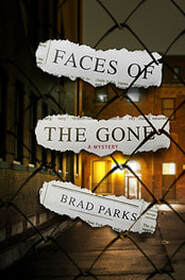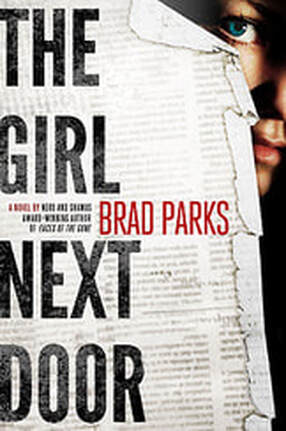INTERVIEW
A Trip Through The Garden State: AN INTERVIEW WITH bRAD pARKS
BY cHERITA hARRELL & cAROLINE mARINARO
2013

When a person thinks of New Jersey “inspirational” may not be the first thought that comes to mind. However, this is how author—and Shamus and Nero award recipient—Brad Parks describes the Garden State. Although his contributions to the crime-fiction genre are fairly recent—his first book Faces of the Gone was published in 2009—Parks is no stranger to crime writing. In fact, the first book in his Carter Ross series is loosely based on a quadruple homicide in Newark—a story he covered while working as a reporter for The Star-Ledger.
In reading a Parks novel, readers can expect a story that examines social and political issues—while still maintaining a level of humor that reflects Parks’ amiable personality. Although his stories deal with darker topics, Parks’ witty persona comes across in his writing, and his stories take readers on a journey through New Jersey—a place which Parks describes as both energetic and electric.
In reading a Parks novel, readers can expect a story that examines social and political issues—while still maintaining a level of humor that reflects Parks’ amiable personality. Although his stories deal with darker topics, Parks’ witty persona comes across in his writing, and his stories take readers on a journey through New Jersey—a place which Parks describes as both energetic and electric.
Cherita Harrell & Caroline Marinaro: You were born in New Jersey but raised in Connecticut. How has living and working in New Jersey affected your writing, both in subject matter and in your style of writing?
Brad Parks: Maybe I shouldn’t say this in the aftermath of Hurricane Sandy, but what I’ve always loved about New Jersey is its energy. It is just an electric, alive place, and I don’t think you can appreciate how true that is until you’ve moved somewhere else that doesn’t quite have the same pulse.
Small towns all have these great personalities. The cities are fascinating patchworks of humanity. Even the suburbs have character – and where else in America can you find that? The people are tough and talented, smart and genuine, and they know how to use a jug-handle. There’s history and great stories – told and untold – around every corner. And let’s not even talk about the food. I’m not sure the exact mechanism underlying the link between great pizza and great writing, but it has to be there somewhere. Just look at what the state has given crime fiction writing alone: Mary Higgins Clark, Harlan Coben, Janet Evanovich, David Rosenfelt, Wallace Stroby…I think we all benefit from the state’s vitality and, hopefully, that shows in our writing.
CH & CM: Why do you set all of your books in New Jersey?
BP: New Jersey really loads a writer’s toolbox with possibility, especially a crime fiction writer. We have every ethnicity imaginable, and therefore every ethnic mob. We have every religion, every socioeconomic strata, every color and flavor of human being you can find. We are either the first or second richest state in terms of per capita income, yet we also have two of the poorest cities in Newark and Camden. And yet – here’s the important part – New Jersey is the most densely populated state in the union. So all those rich people, and all those poor people, and all those religions, and ethnicities? They can’t help but bump into each other. It’s in those intersections that you’ll often find the best stories.
Brad Parks: Maybe I shouldn’t say this in the aftermath of Hurricane Sandy, but what I’ve always loved about New Jersey is its energy. It is just an electric, alive place, and I don’t think you can appreciate how true that is until you’ve moved somewhere else that doesn’t quite have the same pulse.
Small towns all have these great personalities. The cities are fascinating patchworks of humanity. Even the suburbs have character – and where else in America can you find that? The people are tough and talented, smart and genuine, and they know how to use a jug-handle. There’s history and great stories – told and untold – around every corner. And let’s not even talk about the food. I’m not sure the exact mechanism underlying the link between great pizza and great writing, but it has to be there somewhere. Just look at what the state has given crime fiction writing alone: Mary Higgins Clark, Harlan Coben, Janet Evanovich, David Rosenfelt, Wallace Stroby…I think we all benefit from the state’s vitality and, hopefully, that shows in our writing.
CH & CM: Why do you set all of your books in New Jersey?
BP: New Jersey really loads a writer’s toolbox with possibility, especially a crime fiction writer. We have every ethnicity imaginable, and therefore every ethnic mob. We have every religion, every socioeconomic strata, every color and flavor of human being you can find. We are either the first or second richest state in terms of per capita income, yet we also have two of the poorest cities in Newark and Camden. And yet – here’s the important part – New Jersey is the most densely populated state in the union. So all those rich people, and all those poor people, and all those religions, and ethnicities? They can’t help but bump into each other. It’s in those intersections that you’ll often find the best stories.

CH & CM: So is it safe to say you find Newark inspiring?
BP: A friend of mine once likened Newark to a bad codependent relationship. No matter what the other person does to you, you keep coming back to it. I guess that’s a strange way of saying I love Newark, even as I’m aware of its many shortcomings. It’s a city that can inspire you and enthrall you and then break your heart, all in the same thirty seconds. There’s a yearning for something more, a deep sense of resilience and even real achievement right alongside some of the most horrific wastes of money and human potential you’ll ever see. If that doesn’t inspire storytelling, I don’t know what does.
The thing about Newark that outsiders don’t necessarily recognize is that what happens there really matters to all of us, whether we live there or not. Donald Malafronte, the right-hand man to Mayor Hugh Addonizio, once wrote, “Wherever American cities are going, Newark will get there first.” Malafronte crafted that line in the Sixties, but it’s still true today. Newark really is the ground floor of the American Dream and has been for a long time. It’s a place filled with some of our most desperate cases and some of our most hopeful immigrants. If we can make Newark work, the rest of America will be easy.
CH & CM: That feels like a good place to mention your novels. Your first book, Faces of the Gone, was based on the quadruple homicide in Newark that you covered when you were a journalist. The subsequent books in your Carter Ross series also derive from your experiences as a journalist in Newark. While your books are, on the surface, about crime reporting, they touch on bigger social issues – political corruption, the economic recession, and so on. Do you find it difficult to incorporate these social themes into your stories?
BP: I actually start with the social themes and work from there… This is something of an outcropping of my journalistic training. Oftentimes, a reporter decides he wants to write about an issue then finds a story that illuminates it somehow… As a novelist, I do the same thing. I pick an issue that I feel is interesting or important. Then I imagine a crime that might result from that, who might have cause to commit that crime and so on. That’s actually how I think of the books. Faces of the Gone is about drugs. Eyes of the Innocent is about the foreclosure crisis. The Girl Next Door is about the struggling newspaper business. The Good Cop, which is due out in March 2013, is about gun smuggling… I always want to feel like I’m entertaining people with a good story, but also – without being pedantic about it – like I’m educating them about an important subject.
BP: A friend of mine once likened Newark to a bad codependent relationship. No matter what the other person does to you, you keep coming back to it. I guess that’s a strange way of saying I love Newark, even as I’m aware of its many shortcomings. It’s a city that can inspire you and enthrall you and then break your heart, all in the same thirty seconds. There’s a yearning for something more, a deep sense of resilience and even real achievement right alongside some of the most horrific wastes of money and human potential you’ll ever see. If that doesn’t inspire storytelling, I don’t know what does.
The thing about Newark that outsiders don’t necessarily recognize is that what happens there really matters to all of us, whether we live there or not. Donald Malafronte, the right-hand man to Mayor Hugh Addonizio, once wrote, “Wherever American cities are going, Newark will get there first.” Malafronte crafted that line in the Sixties, but it’s still true today. Newark really is the ground floor of the American Dream and has been for a long time. It’s a place filled with some of our most desperate cases and some of our most hopeful immigrants. If we can make Newark work, the rest of America will be easy.
CH & CM: That feels like a good place to mention your novels. Your first book, Faces of the Gone, was based on the quadruple homicide in Newark that you covered when you were a journalist. The subsequent books in your Carter Ross series also derive from your experiences as a journalist in Newark. While your books are, on the surface, about crime reporting, they touch on bigger social issues – political corruption, the economic recession, and so on. Do you find it difficult to incorporate these social themes into your stories?
BP: I actually start with the social themes and work from there… This is something of an outcropping of my journalistic training. Oftentimes, a reporter decides he wants to write about an issue then finds a story that illuminates it somehow… As a novelist, I do the same thing. I pick an issue that I feel is interesting or important. Then I imagine a crime that might result from that, who might have cause to commit that crime and so on. That’s actually how I think of the books. Faces of the Gone is about drugs. Eyes of the Innocent is about the foreclosure crisis. The Girl Next Door is about the struggling newspaper business. The Good Cop, which is due out in March 2013, is about gun smuggling… I always want to feel like I’m entertaining people with a good story, but also – without being pedantic about it – like I’m educating them about an important subject.

CH & CM: You also incorporate a lot of humor into your books. Is there a specific reasoning behind this approach?
BP: It’s probably just a reflection of my personality. I am serially incapable of being serious about anything for too long. If I’ve gone 10,000 words without typing a scene that cracked me up, I’m going to have Carter Ross get chased through Newark by a bear, just to lighten things up…
I was a nerd growing up (and probably still am a nerd). Books were my friends. Sometimes my only friends. And I don’t know about you, but I like my friends to be serious and silly – to be able to reflect on the most profound aspects of the human condition one moment and then be telling sheep jokes the next. I want to write books that have that kind of range.
CH & CM: Since we’re talking about your versatility as a writer, over the years you’ve published a few blog posts--Booktrib, Pens Fatales, Kill Zone, Poe’s Deadly Daughters—do you think it is important for writers to dabble in other areas of writing such as blogs?
BP: I think it can be interesting for a writer to experiment in different forms, and the art of the blog post is among the newest of the forms (with the 140-character Tweet an even newer one). More than anything, I’ve always believed that once you educate yourself on the expectations of whatever literary realm you’re attempting to enter, a real writer can write anything – whether it’s a 90,000-word page-turning thriller or a seven-word haiku. Just remember the thriller is probably going to pay better.
CH & CM: Speaking of the Kill Zone blog, in a post you stated that the process of writing is like “open water distance swimming”. Can you elaborate on this?
BP: I start each writing day on (metaphorical) dry land and then toss myself in water over my head. I know I’m eventually going to have to get myself back to dry land, I just have no idea what I’ll face (waves, tides, currents, jellyfish) along the way. But there’s only one way I can get back to safety: I have to keep swimming. If I stop stroking, I’ll drown.
I suppose if I wanted to be more prosaic I could have said it’s like running a marathon, inasmuch as you have to keep putting one foot ahead of the other. But, the fact is, if you stop running in the middle of a marathon, nothing all that bad happens to you...I like that in the open water swimming analogy, the consequences are more dire. Plus, where I do my swimming, the water is pretty murky. Not knowing what’s in the water with you can be great motivation to keep you moving. The point is, in writing or in life, you have to keep forward momentum. It’s really the only way to reach your goal.
BP: It’s probably just a reflection of my personality. I am serially incapable of being serious about anything for too long. If I’ve gone 10,000 words without typing a scene that cracked me up, I’m going to have Carter Ross get chased through Newark by a bear, just to lighten things up…
I was a nerd growing up (and probably still am a nerd). Books were my friends. Sometimes my only friends. And I don’t know about you, but I like my friends to be serious and silly – to be able to reflect on the most profound aspects of the human condition one moment and then be telling sheep jokes the next. I want to write books that have that kind of range.
CH & CM: Since we’re talking about your versatility as a writer, over the years you’ve published a few blog posts--Booktrib, Pens Fatales, Kill Zone, Poe’s Deadly Daughters—do you think it is important for writers to dabble in other areas of writing such as blogs?
BP: I think it can be interesting for a writer to experiment in different forms, and the art of the blog post is among the newest of the forms (with the 140-character Tweet an even newer one). More than anything, I’ve always believed that once you educate yourself on the expectations of whatever literary realm you’re attempting to enter, a real writer can write anything – whether it’s a 90,000-word page-turning thriller or a seven-word haiku. Just remember the thriller is probably going to pay better.
CH & CM: Speaking of the Kill Zone blog, in a post you stated that the process of writing is like “open water distance swimming”. Can you elaborate on this?
BP: I start each writing day on (metaphorical) dry land and then toss myself in water over my head. I know I’m eventually going to have to get myself back to dry land, I just have no idea what I’ll face (waves, tides, currents, jellyfish) along the way. But there’s only one way I can get back to safety: I have to keep swimming. If I stop stroking, I’ll drown.
I suppose if I wanted to be more prosaic I could have said it’s like running a marathon, inasmuch as you have to keep putting one foot ahead of the other. But, the fact is, if you stop running in the middle of a marathon, nothing all that bad happens to you...I like that in the open water swimming analogy, the consequences are more dire. Plus, where I do my swimming, the water is pretty murky. Not knowing what’s in the water with you can be great motivation to keep you moving. The point is, in writing or in life, you have to keep forward momentum. It’s really the only way to reach your goal.
Brad Parks is the only author to have won the Shamus Award and Nero Award for the same novel. That book, FACES OF THE GONE, introduced Carter Ross, the sometimes-dashing investigative reporter, who has gone on to star in EYES OF THE INNOCENT and THE GIRL NEXT DOOR, which was named to the Kirkus Reviews' Best Fiction of 2012 list and nominated for a Lefty Award for best humorous mystery. The series, which Shelf Awareness has called "perfect for the reader who loves an LOL moment but wants a mystery that's more than empty calories," has earned starred reviews from Library Journal and Booklist. It will continue with THE GOOD COP (due March 5, 2013) and a fifth, as-yet-unnamed installment. Parks is a graduate of Dartmouth College and spent a dozen years as a reporter for The Washington Post and The (Newark, N.J.) Star-Ledger. He is now a full-time novelist who lives in Virginia with his wife and two small children. See more of Brad Parks at http://www.bradparksbooks.com/author.php.

